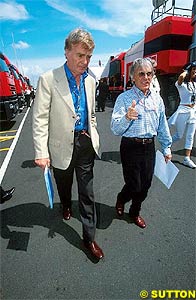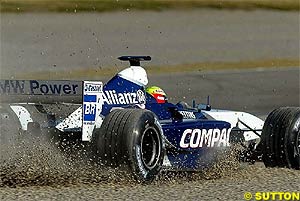
Atlas F1 Columnist
This week's Grapevine brings you |
With viewing figures falling sharply in the light of Ferrari dominance, processional racing and the confirmation of disillusionment amongst hardcore fans, it seems the Bernie Ecclestone is finally going to return his grip to the throat of the sport, and shake it up.
There was a time when Friday qualifying was an important part of the Grand Prix weekend. Any team who failed to make a decent showing were running the risk of being washed out on Saturday. However, it was argued that two qualifying sessions were bad news - with, ironically, the claim that Saturday's spectators were deprived of the joys of a qualifying session if it rained, as none of the teams would waste laps on a wet track, attempting to better their Friday time on a dry track. Costs, of course, were the other driving factor, so Friday became a test day.
For the teams, there is little to gain from the suggested 'four sessions, aggregated times' approach. The top teams are still expected to dominate, and they will be able to afford to fit new 'qualifying specification' equipment for each session. If anything, the gap from have to have-not will increase. However, if it can be shown likely to bring in more spectators, and offers more televised track time, then sponsors will gain better exposure. With sponsorship moving away from tobacco, the better value for money the platform offers, the greater the odds of landing a big cash sponsor. Even the manufacturer backed teams are tightening the purse strings in the current financial climate.
Ron Dennis was quick to demand Ecclestone didn't meddle with the sporting rules of the formula; but then again, his team probably have the most to lose. Reducing the effectiveness of the aero package would serious impact McLaren's future: it has been the greatest strength of their cars since Adrian Newey was brought in from Williams. If there is one area where they are leading the field, this is it. The alternative suggestion - fixing the aero package for half a season at a time - can expect opposition from all the teams; anyone who made a fundamental mistake with their aero package would be stick with it, guaranteeing at least half a season of poor results. Any changes here would certainly come in under protest.
Similarly, changes to remove the electronics would be a problem. The engine manufacturers have been committed to producing units that run for the whole Grand Prix weekend from 2004, and have started working on finding effective solutions. The only route to completely eradicating the question of cheating (an immediate side effect of banning driver aids) would be to limit the electronics used to control the engines. Engine mapping has become so effective, that cars can be set up with a solution that practically emulates traction control, just on feedback between throttle, rev counter and gearing. Furthermore, the semi-automatic gearbox concept, as currently implemented, requires throttle and clutch control be controllable directly by the electronics. Enforcing the divorce of electronics will require a return to manual shifting. which, again, changes the requirements for the engine, significantly affecting its design.
Talk of banning testing at all GP venues via to racing is showing some promise of being accepted, though wider plans to reduce testing days sees plenty of resistance. The idea that costs are significantly reduced if no-one is pounding out testing miles are offset by the fact that the richest teams can afford to develop more sophisticated modelling techniques to use at home - so they actually end up spending more money. Then the less well off teams need to put in testing miles to make up the deficit.
Last into this public arena, the old chestnut of weight penalties for Championship points scorers is making a comeback. In the past, this measure has been dismissed out of hand as an 'artificial' control - hardcore fans traditionally being as opposed to it as the front running teams that it would disadvantage. However, with the bulk of the public audience switching off, and the introduction of artificial rules to pave the way for the concept (recall the rule permitting stewards to penalise an arbitrary ten places on the starting grid for the next event), opposition is at its mutest ever.
Measures that have seen no media coverage include the provision of compulsory components - mentioning the potential to fix a source of gearboxes, brakes, suspension, fuel and oil, and the front and rear wings themselves - and compelling teams to submit blueprints for any car they race, to be made public after a grace period. Either would sort out escalating costs: off the rack components, or effectively having the results of developments put into the hands of the competition would both prove effective; but the front runners are clearly not taken with the idea. Other ideas, including the return of slick tyres, through compelling a single tyre supplier, are also up for discussion between the team chiefs, Ecclestone and Max Mosley.
Whatever actions are enforced will probably be implemented as "sporting" changes, not "technical" changes - then they can be brought in despite objections from half the teams. However, with Ford, Renault, Toyota and Honda all pressing for changes that make it easier for them to compete, it's only the front three teams (plus Sauber, whose vote is tied to Ferrari's) lining up to prevent change. Provided the changes come across as balanced - ie, improving their odds of winning races - that is.
How it all pans out is going to depend on several meetings, starting in Suzuka, where Ecclestone will be seeing all of the team chiefs to talk about their concerns, what measures they will consider, which they cannot contemplate, and what they will expect in return.
The timing of Williams publicising an offer for BMW to buy into the team is exquisite.
The mutterings became public a couple of months back, resulting in Williams stepping forward to defend their record, carefully. Besides which, the only other teams who might build better chassis in the next couple of years are Ferrari and McLaren, neither of whom are prepared to change their engine arrangements. Going the Toyota route, and putting together a team from scratch, is an option that BMW would rather avoid, as the startup costs are prohibitively high, not to mention the years it would take to get up to speed with chassis technology.
Unless, of course, BMW can get their engineers involved sufficiently deeply in an existing team to pick up a lot of that knowledge in advance.
Rumours that BMW have a plane full of engineers coming over to strengthen Williams in all departments are wide of the mark: a large handful are involved in working with Williams' engineers on the drive train, including the gearbox and its housing. More are looking at suspension technology, particularly relating to airflow around the members, in the hopes that their experience could offer more insights and opportunities.
All of these engineers, inevitably, are working on a wide remit, which leaves them exposed to proprietary development detail. As the package becomes ever better integrated, the engine and chassis-manufacturer relationship continues to strengthen, and the distinction between BMW and Williams engineers is already starting to blur.
It's the move to 'complete package' solutions that has finally driven Williams to consider maintaining complete independence: that, and the knowledge there is no other major manufacturer who could replace BMW and do an equivalent job in the short term. Maintaining independence permits continued negotiations with Renault, Honda and Toyota (all of whom have been sounded out as potential works partners in a couple of years) but at the cost of less effective integration with BMW in the meanwhile.
Of course, rumours of BMW heading off to set up their own team do nothing but sow discord at the factories. Partial ownership settles that issue once and for all, improving the stability of the team. Similarly, knowing that both Frank Williams and Patrick Head are no longer spring chickens carries its own uncertainties: offering the employees a potential future, beyond the current leadership, as the Formula One sporting arm of a major manufacturer demonstrates powerful vision. Especially for those with equity in the company.
![]() Smoke Signals
Smoke Signals
 The suggestions made through the media, including a reduction of aerodynamic influences, elimination of driver aids, improved spectator viewing for Friday and Saturday though tinkering with the qualifying, and a performance levelling system are off the top of a fairly long list of changes that Ecclestone would like to see. Some are never likely to see the light of day, but others have merit that is gathering momentum hand over fist with the majority of the paddock.
The suggestions made through the media, including a reduction of aerodynamic influences, elimination of driver aids, improved spectator viewing for Friday and Saturday though tinkering with the qualifying, and a performance levelling system are off the top of a fairly long list of changes that Ecclestone would like to see. Some are never likely to see the light of day, but others have merit that is gathering momentum hand over fist with the majority of the paddock.
![]() Williams Raise the Stakes
Williams Raise the Stakes
 Over the course of the season, there has been a lot of muttering from the BMW camp concerning the performance of the Williams chassis. Last year's engine performed well, in a chassis that did the job; that Williams have not made the same strides in moving forwards has come as something of a blow to the German manufacturer, as it indicates next year will be a struggle to win races, let alone the Championship. Not what the game plan called for at all, in fact.
Over the course of the season, there has been a lot of muttering from the BMW camp concerning the performance of the Williams chassis. Last year's engine performed well, in a chassis that did the job; that Williams have not made the same strides in moving forwards has come as something of a blow to the German manufacturer, as it indicates next year will be a struggle to win races, let alone the Championship. Not what the game plan called for at all, in fact.
Please Contact Us for permission to republish this or any other material from Atlas F1.
|
Volume 8, Issue 41
Atlas F1 Exclusive
Niki Lauda: No Boundaries
Renault's Off Season
Jo Ramirez: a Racing Man
Japanese GP Preview
Japanese GP Preview
Local History: Japanese GP
Japan Facts & Stats
Columns
The Japanese GP Quiz
Bookworm Critique
Rear View Mirror
Elsewhere in Racing
The Grapevine
> Homepage |